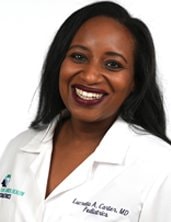Pediatrician provides tips for parents amid drastic rise in RSV cases in young infants, children
Like health systems across the country, Tidelands Health is seeing a dramatic rise in cases of respiratory syncytial virus -- or RSV -- in children.
The number of cases is significantly higher than in recent years when COVID-19 precautions of social distancing and the use of face masks also limited the spread of other respiratory viruses such as flu and RSV. Children – especially babies - are being diagnosed with RSV in Tidelands Health outpatient offices, as well as in the system’s hospitals in Murrells Inlet and Georgetown.
 “RSV is rampant in our community right now and affecting many more young children than we’ve treated in the past several years,” Dr. Lucretia Carter, pediatric medical director at Tidelands Health, said. “RSV typically is common among young children during the winter, but we are definitely seeing more cases this year and even earlier than usual. I personally have diagnosed two cases in the past few hours already today.”
“RSV is rampant in our community right now and affecting many more young children than we’ve treated in the past several years,” Dr. Lucretia Carter, pediatric medical director at Tidelands Health, said. “RSV typically is common among young children during the winter, but we are definitely seeing more cases this year and even earlier than usual. I personally have diagnosed two cases in the past few hours already today.”
RSV spreads in the same way as other respiratory illnesses – through respiratory droplets traveling through the air or transferred via shared objects. Early symptoms include a runny nose, decreased appetite and a cough that includes wheezing. RSV is common in children 2 or younger and usually produces mild, cold-like symptoms that can be treated with supportive care at home.
But RSV can be more dangerous in young infants, possibly leading to severe conditions including bronchiolitis, which is inflammation of the small airwaves in the lungs, and pneumonia in children younger than a year old. Infants who develop such severe symptoms to require hospitalization may be treated with oxygen, intubation or mechanical ventilation. Most recover and are able to be discharged in a few days.
Dr. Carter encourages parents to follow simple precautions to protect their children and limit spread of RSV: Wash hands regularly, do not share cups and utensils, cover coughs and sneezes, disinfect surfaces and frequently touched objects such as doorknobs and toys and stay home when sick.
“We encourage parents to know the potential signs of the virus and take the simple precautions to protect their children from this rapidly spreading virus,” Dr. Carter said.
Learn more about RSV from Dr. Carter in a Better Health Podcast episode available here.